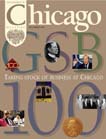The University of Chicago Magazine
December 1997

Look up D. Gale Johnson on University faculty rosters and here's what you'll see: "Editor, Economic Development and Cultural Change; Eliakim Hastings Moore Distinguished Service Professor Emeritus of Economics and the College, and Chairman of the Undergraduate Program in Economics." That's a mouthful for any faculty member, emeritus or otherwise, but it only hints at his stature within the University.
Allen Sanderson, a colleague in economics who co-taught the fourth-year honors seminar with Johnson for a couple of years, paints a more human portrait: "Gale is so eloquent in the classroom. He has absolute mastery and devotion to logical thinking in the application of economics. He can move easily from one topic to another, his expertise is so broad. He'll go out of his way to help a student get a paper published. He is as good a person as he is a scholar."
Former students tend to remember their mentor almost as much for personal kindnesses as for what they learned in his classes. One former doctoral student marvels to this day that his teacher lent him the down payment for a house decades ago. Another, who came to Chicago fresh from China, recounts how Johnson arranged for him to spend several days on a brother-in-law's farm to help the newcomer understand the American way of life.
Says Justin Lin, "From other Chinese alumni, I understand that all of us received from Professor Johnson the same care, attention, advice and help in our life. Now that we are all professors ourselves, he is the model for our work."
"I love the man," says Zvi Griliches, AM'55, PhD'57, a professor of economics at Harvard who studied at Chicago in the 1950s. "When I was a student, Gale was always around and always helpful. He did important things in agricultural economics, but he was overshadowed for decades by Ted Schultz, the 1979 Nobel Laureate in economics. Gale is a private man who kept a bit of a low profile."
Sanderson finds that modesty a big part of Johnson's charm. "He has no ego. There is always a sparkle in his eye and a spring in his step. We had a birthday party for him when he turned 80, but I never think of him as anything other than 40."
Currently co-teaching the honors seminar with Johnson is Robert Lucas, AB'59, PhD'64, another of the University's Nobel laureates in economics. "That means," Sanderson says, "those lucky undergraduates are taking the course from a Nobel Prize winner and the president of the American Economic Association."
Although he now teaches only undergraduates, Johnson estimates he's served on "something like 150 Ph.D. committees" over the years. His former students can be found all over the world, many of them teaching in universities, and most of them outspoken in their admiration of him. Daniel Sumner, AM'77, PhD'78, for example, a professor of agricultural and resource economics at the University of CaliforniaDavis, calls Johnson "a giant in agricultural economics," and adds, "My respect for him grows the more my own knowledge deepens and the more I continue to learn from reading his work and listening to his current thought in seminars."
Johnson's interests don't range very far from his life's work, which he has always found fulfilling. He still engages in a robust publishing life, adding regularly to a publications list that covers some 15 pages, single spaced. The one pleasure to rival economics is his grandchildren-make that four pleasures. The youngest of the four is a 6-year-old Chinese girl whom daughter Kay Ann adopted from a Chinese orphanage for abandoned children. A professor of Asian studies and politics at Hampshire College in Amherst, Massachusetts, Kay Ann also is the mother of a 10-year-old boy. Son David, MBA'81, who works for a hospital supply business in central Pennsylvania, is the parent of a boy and a girl as well.
Johnson's wife of 50 years, Helen, died in 1990 of meningitis, a disease that usually picks on much younger victims. Until this past fall, Johnson lived in the Hyde Park house he and Helen built 40 years ago. It was a 12-minute walk to campus. The condominium he has moved into is a 22-minute walk to his book-crammed office on the fourth floor of the Social Sciences building.
It's a walk Gale Johnson continues to enjoy almost daily-when he's in Chicago. Right now he's in the thick of his duties as president-elect of the prestigious American Economic Association. In January of 1999 he'll take over as president of that body. "All the work, though, is in the first year," he says.
In March he expects to be back in Beijing, checking in with some 30 Chinese Ph.D. candidates in a special program organized by an international faculty committee for students from China's agricultural universities. Beyond that, he's already planning another China visit for next summer. And who can say where else he'll turn up before the fall 1998 quarter calls him back to the classroom?
Walton R. Collins is a free-lance writer and adjunct associate professor in the University of Notre Dame's Department of American Studies. He is the former editor of Notre Dame Magazine.
